Last Updated on July 22, 2022
“A Very British Scandal,” like its predecessor “A Very English Scandal,” looks closely at a particularly thorny relationship that played out in the public eye. Both 3-episode miniseries tease apart these true-to-life dramas to see what they tell us about Britain’s past, and our own biases.

To help keep this site running: Willow and Thatch may receive a commission when you click on any of the links on our site and make a purchase after doing so.
But where “A Very English Scandal” is a comedic drama about an MP conspiring to murder his ex-lover, “A Very British Scandal” (2021) is a weighty affair. Show creator Sarah Phelps, who has written the screenplays of many of the new, dark Agatha Christie adaptations, takes on the salacious divorce of the Duke and Duchess of Argyll.
“A Very British Scandal” excels in making a remote society problem–two aristocrats suing one another for divorce in 1960s Britain, along with conflicts over paternity and ownership over castle property–into a meditation on feminism and sex positivity that feels completely pertinent to the present.
“A Very British Scandal” opens in 1963, with Britain eagerly watching a very messy society split play out in the courts. The Duke and Duchess of Argyll (Paul Bettany and Claire Foy) have sued each other for divorce.
He, Ian Campbell, has broken into her house and taken her private papers and is using them as evidence of her infidelity with some 88 men. She, Margaret Campbell, has accused him of conducting an affair with her stepmother. Of all the accusations and evidence, the most shocking is a very compromising photo of the duchess having sexual relations with someone who is not the duke.
The series quickly backtracks to the start of their relationship. After meeting on a train, Margaret and Ian quickly fall in love and marry. She is seduced by his charm and his castle; he by her beauty and her money.

Despite their initial attraction, they begin to butt heads. He feels she controls the pursestrings, while she thinks he’s a spendthrift. She’s disgusted that despite the money she’s spent on the castle, she has no right to live there after his death; he resents that she keeps a separate house in London. He is suspicious of her male friends; she doesn’t like his drinking and amphetamine habit.
They each have a long list of failings. But when their marriage finally falls apart, what the court case and the series really boil down to is a woman’s ability to enjoy her own sexuality.
The real Duchess of Argyll granted several interviews over the years, was the subject of the biography The Duchess Who Dared, and published the memoir Forget Not. But Margaret Campbell’s life has only been covered in popular culture by an opera (Powder Her Face), and the events of the television series will be fairly new to most viewers.
Though the courtroom drama took place over 50 years ago, the series feels very of the moment. The sensational trial we see, and especially the feverish public response to the divorce, calls to mind the reaction to the recent Johnny Depp and Amber Heard libel trial. The comparison points both to the degree to which the public can identify with public figures, but also the idea that these 1960s British aristocrats were on par with film stars.
Modern audiences will cringe at the outrage heaped on Margaret for her sex life, and they’ll also relate. Watching men take apart a woman’s credibility based on her sexual experiences feels all too familiar.
Initially Claire Foy seems to be channeling her recent role as Queen Elizabeth II as a chilly society woman of the 1950s, but her performance evolves as she expresses Margaret’s lighter side as adeptly as her more Machiavellian tendencies. Paul Bettany is convincing as Ian the charmer, enthralling all of his wealthy wives before abruptly transforming into the mercurial and frightening man he is underneath.
Foy and Bettany are well-matched in their depiction of a couple once physically attracted to one another, but now fixated on winning the battle of public opinion, and seeing the other lose it.
The somewhat dour tone of the series exists for a good reason, and to good effect. We are, after all, watching two former lovers take one another apart in court, and Sarah Phelps makes it clear who viewers are meant to side with.
We recognize Margaret’s failings but feel anger on her behalf: anger for a marriage under false pretenses, anger for a husband being able to break into her house and steal her private papers, anger for a legal system that does not see this as a crime, and anger at a society that humiliates and shuns a woman for enjoying her body.

Despite the indignation you’ll feel, it is still quite fun to watch “A Very British Scandal.” The writing is sharp–in turns humorous and biting as it needs to be. While waiting to inherit the Argyll dukedom, Ian suggests that the eccentric duke put on a pair of wings and fly away, and the unapologetically liberated Margaret talks about her sexual drive with a friend: “It’s not my fault, Maureen, that you’re no good at it. I do like it. I like it very much. And I am good at it.”
Also making the series a pleasurable watch: the British period drama is beautifully shot. The real Inveraray Castle makes multiple appearances, and the Scottish highlands provide a moody setting for major events.
When the excellent script and superb acting combine, we can’t help but reflect on how far we’ve come in terms of sex-shaming, and rights within the marriage. “A Very British Scandal” also reminds us how far we still have left to go.
“A Very British Scandal” (2021) is AVAILABLE to STREAM
Rated 16+
Alyssa Murphy is a freelance writer living in Alexandria, Virginia. She has worked in communications for education, economic independence, and environmental nonprofits and was the editorial manager for a child psychiatry journal. In her free time, she enjoys listening to dramatized Agatha Christie mysteries and studying grand English country houses.
If you enjoyed this post, wander over to The Period Films List.

